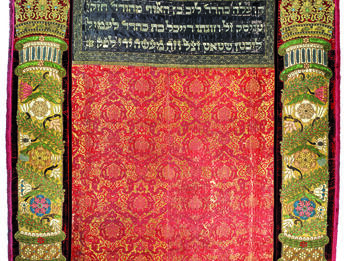Escamot (Ordinances)
Escamot made by the Brethren of this Holy Hebra of Bikur Hulim [visiting the sick—Ed.] and Guemilut Haçadim [giving of loving-kindness—Ed.], in company with the Senhores of the Mahamad [board of governors—Ed.] of this Kaal Kados [congregation—Ed.] of Saar Asamaim [Gate of Heaven—Ed.] (which God prosper), ordained on the 1st of Nisan 5425: which be in the name and to the glory of the Blessed God, Amen.
1st
There shall be made a board, whereon shall regularly be set the names of the Brethren that be now, as also those of them that shall enter in the future, who shall elect, in company with the Mahamad, an Administrator, who shall serve for one year, beginning on the 1st of Nisan, and he shall attend with great care both to the sick who may have need of this Hebra and afterwards to the dead for their shroud and burial, expending what is most necessary according to the quality of each one; and if the revenue of this Holy Hebra shall not suffice, the Gabay [beadle—Ed.] of the Sedaca [charity fund—Ed.], which shall serve as general purse, shall supply it.
2nd
That the said Administrator shall have the care of visiting the sick, and if there be need for one who should watch over them, he shall send by the Samas [sexton—Ed.] [the one of the Brethren] on whom it shall devolve in turn according to the table, who shall be obliged to go to watch for his six hours or to send another person in his place, and the same shall be in case of death (barminan) to lay him in his shroud, [and] make the grave, until burying him, it being understood that in the matter of watching and laying in the shroud, if [the deceased] be a woman, [he shall do it] also with the wives of the Brethren, because [there is] no work so meritorious and of such charity, and as soon as there may be any pious ladies who may desire to enter as Sisters, they should report themselves, in order that Miseberah [blessing for health—Ed.] may be offered for them.
3rd
All the Brethren shall be obliged to go up to the Sepher [Torah scroll—Ed.] and make a Promessa [pledge—Ed.] for the Hebra of what they may be moved to give, and on the Sabbath following the election of the Administrator there shall be made every year a Nedava [voluntary offering—Ed.] for the said Hebra.
4th
There shall be a physician of the Hebra, who either by salary or Miseberah that may be offered for him to that end shall be obliged to attend the sick thereof as soon as he shall have been informed by the Samas, that visiting him he shall prescribe what is needful, both in the matter of medicines and the maintenance of the sick person, which when [it is] signed by his hand the Administrator shall be obliged to send him every day.
5th
Likewise there shall be a Hazan of the Hebra, who shall attend on the occasion of death to the Circuits, Betahaim [cemetery—Ed.], and reading prayers in the house of the Avel, giving him the first Seuda [meal—Ed.] of the egg, which shall be brought him from the house of the Administrator, as is customary in Israel.
6th
The Administrator shall have the key of Betahaim, and no one shall be buried therein without him giving orders as to where [the grave shall be], in order that it may proceed regularly and by numbers, he recording it with much care at the time, so that there may not be the abuse of opening a grave in which there shall have been a burial.
7th
The Administrator shall not have authority to allow the burial of any uncircumcised man, nor any of his belongings,1 without holding a meeting of 6 of the Elders of the Hebra, so that in company with the Mahamad they may consider what seems good to them, which he shall be obliged to follow.
8th
That there shall be placed in Betahaim a board with the names of the deceased Brethren, so that every time that one goes there an Escava [memorial prayer for the dead—Ed.] may be offered for them.
9th
That there be a box in Betahaim, in order that those who go there may deposit alms, of which the Administrator shall keep account, as well as of the Promessas, so as to hand it over with the balances to the succeeding [Administrator]; and if he have a lack, the Gabay of the Sedaca shall supply it before he leaves, as is above set forth; and howsoever it be, the said account shall be read out on the Tebà [reading platform—Ed.] on the Sabbath of the Nedava, in order that the state thereof may come to the notice of the Brethren.
Isha Dazevedo
Notes
Unless indicated as editorial additions, words in brackets appear in the original translation.
Literally, nem couza sua, “nor his thing,” i.e., anyone belonging to his family or otherwise dependent on him.
Credits
Published in: The Posen Library of Jewish Culture and Civilization, vol. 5.




